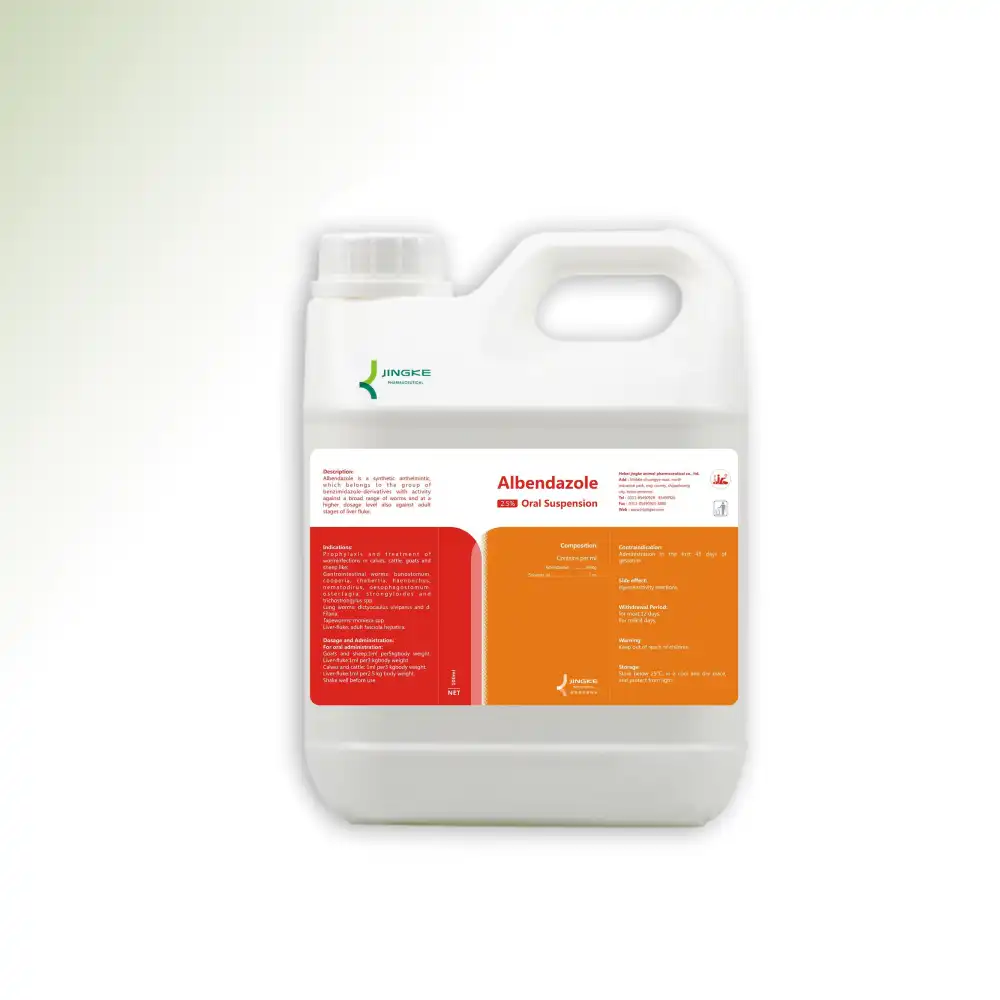I. Pharmacological Action of Albendazole
Albendazole is a benzimidazole derivative, a broad-spectrum, highly effective, and low-toxicity anthelmintic drug. It is highly effective against various nematodes in many animals and also has a strong expelling effect on certain trematodes and cestodes. This drug is insoluble in water, highly lipophilic, and absorbed from the digestive tract more easily than other drugs in its class. Its hepatic metabolite, albendazole sulfoxide, possesses anthelmintic activity. It is effective against gastrointestinal nematodes, lungworms, liver flukes, and tapeworms in ruminants, horses, pigs, dogs, and poultry. A single administration of this product can expel mixed parasitic infections in animals, such as various intestinal nematodes in ruminants, swine kidney worms, esophageal mouthworms, roundworms, whipworms, horse roundworms and pinworms, and chicken roundworms and cecal worms. It is also effective against tapeworms, liver flukes, Fascioloides magna, and Dicrocoelium dendriticum in cattle. It has a particularly significant effect on Cysticercus cellulosae in pigs and Cysticercus bovis in cattle, making it a good current drug for treating cysticercosis. Clinically, it is mainly used for animal nematodiasis, cestodiasis, and trematodiasis.

II. Mechanism of Action
Albendazole is a benzimidazole derivative that is rapidly metabolized in the body into albendazole sulfoxide, albendazole sulfone, and 2-amino-albendazole sulfone. It selectively and irreversibly inhibits the polymerization of the cytoplasmic microtubule system in the intestinal wall cells of parasites, blocking their uptake and absorption of various nutrients and glucose. This leads to the depletion of endogenous glycogen in the worms and inhibits the fumarate reductase system, preventing the production of adenosine triphosphate (ATP), ultimately causing the parasites to be unable to survive and reproduce. Similar to mebendazole, this product can also cause degeneration of cytoplasmic microtubules in the intestinal cells of worms and bind to their microtubular proteins, causing intracellular transport blockage. This results in the accumulation of secretory granules in the Golgi apparatus, gradual dissolution of the cytoplasm, complete degeneration of absorptive cells, and ultimately the death of the worms.
III. Combined Use and Contraindications
- Praziquantel: Combined use can increase the plasma concentration of albendazole.
- High-fat foods: Fat can enhance the absorption of albendazole.
- Cimetidine: Can increase the concentration of albendazole in bile and cystic fluid.
- Ivermectin: Combined use can broaden the antiparasitic spectrum.
IV. Precautions for Using Albendazole
① Continuous long-term use can lead to drug resistance in worms and may result in cross-resistance to other benzimidazole drugs.
② Horses, rabbits, and cats are sensitive to this drug; it is advisable to choose other anthelmintics for them.
③ It has embryotoxic and teratogenic effects. It is prohibited for cattle and sheep within 45 days of pregnancy and for pigs within 30 days of pregnancy. It is also not recommended for other animals during pregnancy and is prohibited during lactation.
④ There is no specific antidote for this product. In case of overdose, induce vomiting or perform gastric lavage immediately, followed by symptomatic and supportive treatment.
⑤ Do not use in animals with acute enteritis. Use with caution in animals with a history of epilepsy.
⑥ Use with caution in animals with impaired liver function.
⑦ Withdrawal period: Cattle 14 days, sheep 4 days, pigs 7 days, poultry 4 days, milk discard period 60 hours.
Finally, albendazole is best administered on an empty stomach. Controlled fasting before administration helps the drug exert its effects fully. For deworming drugs like coccidiostats and anti-nematode drugs, administering them on an empty stomach under controlled feeding conditions results in higher drug concentrations in the intestine. This facilitates direct contact between the drug in the intestine and the parasites, enhancing efficacy. Therefore, it is recommended to administer albendazole on an empty stomach after controlled feeding.

